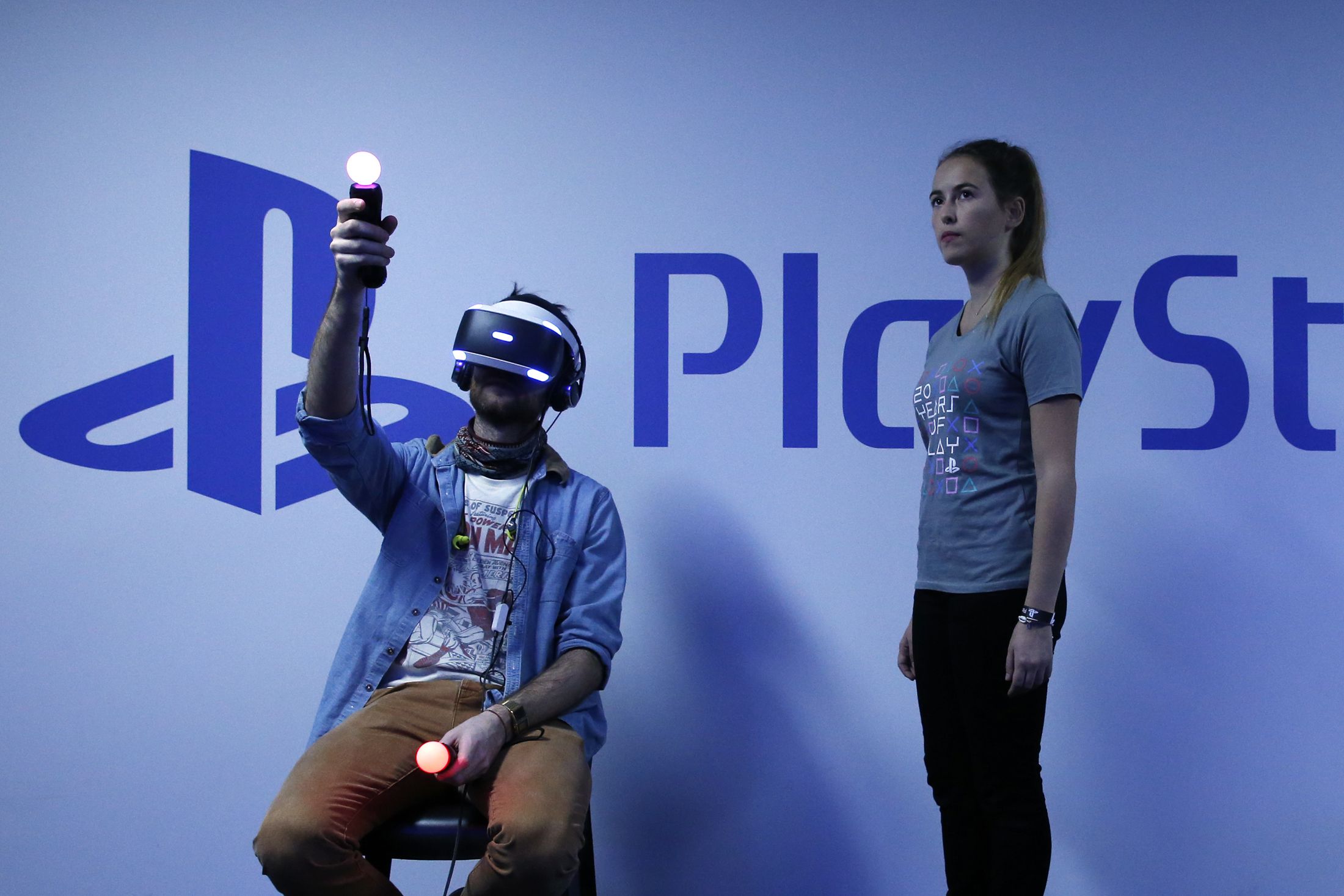
Job Simulator sounds like the last video game a white-collar worker would want to play to wind down, but my own bias vanished after I tried to set my controller on the virtual desk—dropping it straight to the real-world ground.
Alex Schwartz, the chief scientist at Owlchemy Labs which developed Job Simulator, jumped in with Pavlovian reflexes to grab the glowing ice-cream cone–shaped controllers from my hands. "People have dropped it as soon as the game was over," Schwartz told me last weekend at the Sony PlayStation Experience convention in San Francisco.
Job Simulator's graphics are nothing extraordinary and don't even attempt to blur realities together; the game is built in a Minecraft-like world with roughly cut cubes. And yet, with the Sony Virtual Reality (VR) headset and headphones, graphics don't matter as much. As Anton Mikhailov, a co-creator of PlayStation VR's earlier project title Project Morpheus, says in a panel on virtual reality, believability is a far better sell in the VR experience than authenticity.
"The stupidest stuff in VR becomes the most compelling," Mikhailov says. "The first debug thing developers do is place a floating cube in the front of you, and often that floating cube is more compelling than a realistic scene. You've never seen a floating cube before."
First introduced in 2014, PlayStation VR is expected to hit the stores sometime next year, leading the race of tech companies building their own VR systems. Facebook, for example, bought leading VR developer Oculus Rift for $2 billion in March.
Microsoft demonstrated its augmented reality—which, unlike VR, blends the real world with graphics—system called the Hololens for the first time in October. Samsung recently released a Web browser that works on its Samsung Gear VR headset.
Of the current set of VR systems in the market, Oculus Rift is considered to be leading the race, but the landscape may dramatically change once Sony joins the fray. The PlayStation VR, which will run on the PS4 console, already has a small library of developed games ready when it hits the market, some of which allow multiplayer features. For example, Eagle Flight is a game that allows users to fly above the streets of Paris together and engage in aerial dogfights.
For some games, VR-wearing players will be able to join the same multiplayer battles against non-VR players, Richard Marks, the director of Sony's Magic Lab research division, told Newsweek.
Marks and a VR colleague demonstrated a virtual disc-throwing game wearing the PlayStation VR during the keynote presentation—one that was labeled "an embarrassment" by Silicon Valley blog VentureBeat. The demonstration was indeed underwhelming—Marks had trouble finding the disc several times—but Microsoft received similar criticism during its Hololens demonstration for not accurately portraying its current technology.
A better representation may have been another PlayStation VR game ready for launch called Super Hypercube. A simple puzzle game in the same vein as Tetris, players put pieces through distinctly shaped holes in a wall as he or she flies through hyperspace.
Surrounded by neon lights flying past the periphery of the vision like the "star gate" sequence from 2001: A Space Odyssey, Super Hypercube was a brilliantly simple game that would not have been possible on a flat screen, even using its standard PS4 controller.
So far, Marks says Sony has no intentions so far to venture its PlayStation VR headset out of gaming a la Samsung's Web browser. Marks repeatedly stated that the headset is for the gamers—for now—but believes it will have wider appeal once people share the VR experience.
"Initially, people have been like, Oh, I don't know if VR is right for me," Marks says. "But once they tried it on, they were all blown away. And they all wanted to try more and more."
Uncommon Knowledge
Newsweek is committed to challenging conventional wisdom and finding connections in the search for common ground.
Newsweek is committed to challenging conventional wisdom and finding connections in the search for common ground.
About the writer
Seung Lee is a San Francisco-based staff writer at Newsweek, who focuses on consumer technology. He has previously worked at the ... Read more





